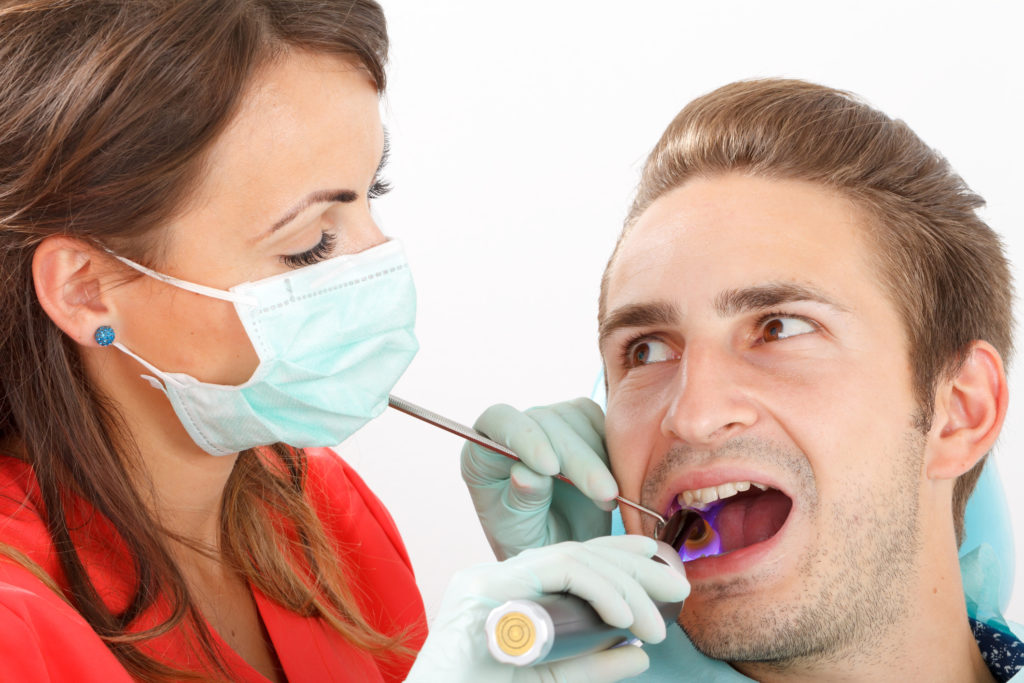Tips on How to Avoid Receding Gums

At our Colorado Springs family dental office, we strive to provide all of our patients with the quality dental care needed to enjoy a healthy, great-looking smile for a lifetime. One of the most common problems we see with patients is receding gums. While this condition is usually attributed to over-brushing or brushing with too much force, it could actually be a sign of advanced gum disease.
Early stage gum disease, or gingivitis, is a chronic infection that causes swelling to develop in your gum tissue. The disease develops when plaque, a biofilm made from harmful oral bacteria and food particles that linger in the mouth after eating, hardens into tartar, a yellowish substance that discolors our teeth and causes inflammation to develop. When gum tissue becomes swollen and inflamed, it begins to pull away from the base of our teeth.
Nearly half of all adults in the U.S. 30 and older suffer from some form of gum disease, according to the Centers for Disease Control and Prevention. While gum disease ranks as the leading cause of receding gums, there are other causes for this potential serious condition. To help you prevent the development of receding gums, here are a few of the causes for this common oral health problem.
Stress
While you can’t always see it, stress actually plays a huge role in determining your oral health. If your jaw feels sore after a particularly stressful day or if your teeth feel sensitive, you’re probably unconsciously grinding or clenching your teeth throughout the day. Clenching your jaw and grinding your teeth impacts the health of your gums and can lead to gum recession.
Over the long-term, these types of daily stress-related habits can begin to break down your tooth enamel. For most people, teeth grinding is a habit that occurs only at night during sleep. This means that most people who grind their teeth don’t even realize they have a problem. However, if you wake up most mornings with a headache, sore jaw or feeling unrested, you could be experiencing nightly teeth grinding.
To minimize the role stress plays in determining your oral health, consider trying to find new ways to helping to reduce the stress in your life. From practicing meditation to boosting your regular exercise routine, there are a number of habits you can embrace that can help make you feel less anxious.
You can also ask our team about tips for preventing nightly teeth grinding during your next visit to our Colorado Springs family dental office. A custom-made mouthguard could provide additional support and protection for your teeth if nightly grinding is behind your morning discomfort.
Brushing too Forcefully
Brushing may seem like a simple habit that by now you probably have mastered, but like most things in life, there is a right and wrong way to brush.
Over-brushing occurs when you brush your teeth with too much force or when you brush your teeth too frequently. While food and bacteria do cling to our teeth, they can generally be removed with the use of minimal pressure. You don’t need to apply the same force as when scrubbing the stains out of a bathtub. That’s why it’s important that you receive instruction on the correct way to brush.
While the American Dental Association has a number of helpful videos on how to master the correct brushing technique, you may find it useful to ask one of our dental hygienists for a few tips during your next visit to our Colorado Springs family dental office. You can also consider using an electric toothbrush. Electric toothbrushes are designed to mimic the correct brushing motion and require almost no force to use correctly.
Use a New Toothbrush
While the toothbrush ranks as the most valuable tool in the fight against receding gums and gum disease, it will eventually break down and need to be replaced. If the bristles of your toothbrush appear broken or frayed, odds are they won’t adequately help to remove plaque and food particles from the surface of your teeth.
While brushing with an old toothbrush isn’t as bad for your oral health as over-brushing or grinding your teeth, it can still contribute to the development of receding gums by not adequately removing plaque from the surface of your teeth. As a general rule, try to make sure you replace your toothbrush at least once every three months.
Don’t Forget to Floss
While it’s true that performing the previously mentioned bad habits can cause gum recession, there is another bad habit that can lead to poor oral health if skipped – flossing. Flossing works to remove plaque and food from areas of the mouth your toothbrush cannot reach – between your teeth and below the gum line.
Failing to floss dramatically increases your risk of developing gingivitis, which also increases your risk for dealing with receding gums. So the next time you consider skipping flossing, just think about how much good such a simple habit can do for your long-term oral health.
For more information or to schedule an appointment at your favorite Colorado Springs family dental office – call us today!
